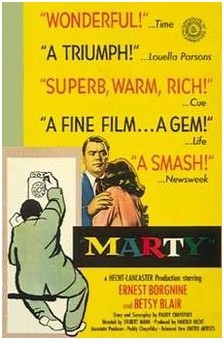

Marty is a 1955 American film directed by Delbert Mann. The screenplay was written by Paddy Chayefsky, expanding upon his 1953 teleplay of the same name. The film stars Ernest Borgnine and Betsy Blair. In addition to gaining an Academy Award for Best Picture, the film enjoyed international success, becoming the second American film to win the Palme d'Or at the Cannes Film Festival. Marty and The Lost Weekend (1945) are the only two films to win both organizations' grand prizes.
Characters and story
The film stars Borgnine as Marty Piletti, a heavy-set Italian-American butcher who lives in The Bronx, New York City, with his mother (Esther Minciotti). Unmarried at 34, the good-natured but socially awkward man faces constant badgering from family and friends to get married, pointing out that all his brothers and sisters are already married with children. Not averse to marriage but disheartened by his lack of prospects, Marty has reluctantly resigned himself to bachelorhood. In spite of his failed love life, Marty maintains an optimistic outlook on life characterized by his frequent outbursts such as "Perfect!" or "Fantastic!".
After being harassed by his mother into going to the Stardust Ballroom one Saturday night, Marty connects with Clara (Betsy Blair), a plain schoolteacher who is quietly weeping on the roof after being callously abandoned at the ballroom by her blind date. Spending the evening together dancing, walking the busy streets, and talking in a diner, Clara and Marty discover many affinities that they share. He eagerly spills out his life story and ambitions, and they encourage each other. He brings Clara to his house, and they awkwardly express their mutual attraction, shortly before his mother returns. Marty, delighted with his new-found love, takes her home by bus, promising to call her at two-thirty the next afternoon, after Mass. In an exuberant scene, he punches the bus stop sign and weaves between the cars, looking for a cab, a rare luxury matching his mood.
Meanwhile, his cranky, busybody widowed aunt moves in to live with Marty and his mother. She warns his mother that living alone, when children marry, is a widow's fate. Fearing that Marty's romance could spell her abandonment, his mother belittles Clara. Marty's friends, with an undercurrent of envy, deride Clara for her plainness and try to convince Marty to forget her and to remain with them, unmarried, in their fading youth. Harangued into submission by the pull of his friends, Marty doesn't call Clara.
That night, back in the same lonely rut (among his regular cast of male friends), Marty realizes that he is giving up a chance of love with a woman whom he not only likes, but who makes him happy. Over the objections of his friends, he dashes to a phone booth to call Clara, who is disconsolately watching television with her parents. When his friend asks what he's doing, Marty bursts out saying:“ You don't like her. My mother don't like her. She's a dog and I'm a fat, ugly man. Well, all I know is I had a good time last night. I'm gonna have a good time tonight. If we have enough good times together, I'm gonna get down on my knees and I'm gonna beg that girl to marry me. If we make a party on New Year's, I got a date for that party. You don't like her? That's too bad! Hey, Ang, when are you going to get married? You're 33 years old, and all your kid brothers and sisters are married. You oughta be ashamed of yourself. ”
Marty then closes the phone booth's door and calls Clara. In the last line of the film, he tentatively says "Hello... Hello, Clara?".
Reception
With an April 11, 1955, premiere (followed by a wide release July 15), the film received overwhelmingly positive reviews from critics. Ronald Holloway of Variety wrote, "If Marty is an example of the type of material that can be gleaned, then studio story editors better spend more time at home looking at television."[4] Time described the film as "wonderful".[5] Louella Parsons enjoyed the film, although she felt that it would not likely be nominated for Oscars.[6] At a budget of $343,000, the film generated revenues of $3,000,000 in the US alone, making it a box office success.



















